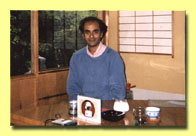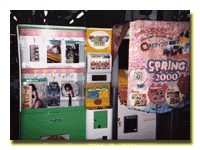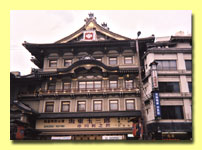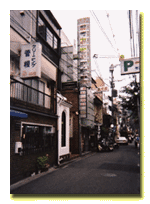 |
 |
 |
|
|||
|
Pico Iyer's Japan
Pico: "Hello, Deborah. I hope you haven't been waiting long..." Probably the only dark-skinned person I've seen since arriving in Japan two days earlier, Pico Iyer isn't hard to pick out of the crowd at the Nara train station. Indian by ethnicity, dressed in blue jeans and a sweatshirt, the travel writer is slight and soft-spoken, with a mellifluous English accent. He makes his home here in Japan, and though this is one of the most foreign places I've ever been, he lives in a place that looks an awful lot like America. He describes it as the Northridge of Japan. Northridge, in case you're not familiar with it, is Anywhere, U.S.A. located in the San Fernando Valley, near Los Angeles. We take a train and then the bus to get to Shi Kanah Die, the suburb where he makes his home. 
Pico: "Well, it's really this synthetic 21st century complex around the train station, everything grey and concrete, everything brand new, nothing really looking Japanese, I would say. I think this represents the contemporary Japanese dream, in which everything Japanese has been transmuted into what looks like a Southern California suburb."
Deborah: "Is it that people have been somewhere like California and decided, 'Oh, we like this. Let's build it'?"
Pico: "Well, no. I think it predates it. Which is why nothing is quite right in the adaptation of Western culture. I think it's just the lure of the foreign, to some extent." Unlike in America, where the San Fernando Valley carries a certain stigma, Pico's Northridge of the East is considered quite chic here. When he first visited Japan more than 12 years ago, he bunked in a monastery in Kyoto. But when he found himself falling into a comfortable routine, with too many American friends living nearby, he shipped out to live with Hiroko, his Japanese girlfriend and her two children.
Pico: "So, this is my glorious house, recently renamed Lime Village Shi Kanah Die, painted a lime color by the new owner who is, between us, a gangster." When I read in one of Pico's books that he lives in a tiny two-room apartment in Japan, I figure it's just a little poetic license at work. After all, a successful writer wouldn't choose to live in such a small space. But when I step inside, I realize it's all true. The largest room is sort of a living room, bedroom, kitchen and dining room combined. The space is neat, but filled with books and souvenirs and music. The second room houses Hiroko's two teenage kids, a bedroom big enough for one average American teenager. And after the family leaves for work and school in the morning, this area becomes something else.
Pico: "I don't have a desk of my own, so I do all my writing at that little desk which actually belongs to my girlfriend's 17 year old daughter. So, as soon as she goes to school in the morning, I come and take over this desk. As you can see, one of the curiosities of sharing a desk with a 17 year old girl is that I'm surrounded more or less by Brad Pitt and teddy bears. I'm sure that when my bosses at Time Magazine or wherever see my copy, they wouldn't begin to believe that I'm sitting ringed in a gallery of Brad Pitt. Here we have Brad Pitt, Johnny Depp dressed as Hunter Thompson, Brad Pitt smeared from The Fight Club, Pitt playing death over here..." 
His so-called office looks out over one of the burb's busiest streets, absolutely deserted at quarter to four in the afternoon. Pico points out the church in the apartment building across the way from which English language hymns float by on Sundays and a vending machine across the street where he can get virtually anything he wants at any time: coffee, tea, beer and pornography. It's a Japanese thing. You see these machines everywhere. As he points all these things out, I see why the detail is so rich in his books. We head out to the shopping area just down the street that's home to one of Pico's favorite haunts: the convenience store. With its fax machine, copier and desk supplies, it serves as a de facto office. And, it's where he usually eats lunch. Yes, here, in the Japanese equivalent of 7-11. Bon Appetit Magazine once asked him to write a piece on haute cuisine and, as since he puts it, he was raised in an English boarding school and knows nothing about good food, he instead wrote a review of all the munchies he finds here.
Pico: "This is a particular favorite of mine, this is a moisture desert. Again, I don't know what it is, but it certainly tastes very good and is very healthy. This looks like lentil flavored curry and lemon flavored yogurt."
Deborah: "Oh, that sounds revolting."
Pico: "But tastes exquisite. This is extremely nice, it says on the cover 'An elegant taste. It's as nice as it is genuine.' It's not genuine, but it is very nice. I was just looking at this area where they're selling stockings that are called 'Sabrina' in acknowledgement of Audrey Hepburn, who is still a great heroine here. And next to them is another brand called 'Iffy', which unfortunately is truer than they might like. Convenience stores are traditionally the area where bad guys and the rebellious teenagers hang out, so for a couple of hours in the evening, around six or seven, all the boys with orange hair will be crouched outside here, squatting above the pavement, talking on their cell phones. But again, being Japanese rebels, they're pretty orderly and they never actually disrupt the life of the convenience store. The convenience store is kind of a part of the floating, global world. It's become the spiritual home of all the rebellious kids. " Going from the mundane, laughing at the silly names for nylons, to drawing some deeper cultural point about the Japanese is one of the things that makes traveling with Pico so much fun. I start to see things in new ways.
Pico: "Here's our local motorbike shop, where my girlfriend is to be seen as she roars around the neighborhood on her motorbike, with me on the back, and everyone taking quadruple takes at this ungainly foreigner clinging onto the back of a tiny Japanese woman." And then, for a contrast, we leave the 21st century American-like suburb and travel back to Nara. Nara was the first permanent capital of Japan, established back in 710. And it's here that Japanese arts and literature were really born.
Pico: "Here again, as you can see rarely for Japan, is a completely undeveloped expanse of land. You can keep walking up these hills and see only more undeveloped hills, and deer and spires of pagodas peeping through the trees."
Deborah: "So what's going on here? Is this renovation?"
Pico: "It may be. They did put something very modern there. I was covering the Olympic Games in Nagano, Japan two years ago, the Winter Olympics in 1998, and there they have one of the great old temples of Japan. And, they literally allowed CBS to build a big tower, a communications tower, in the middle of this ancient tower. They just wiped out the old train station, which was itself shaped like a temple, and turned it into this super-sleek McDonald's kind of a complex. Within the temple compound, they'd set up fake UPS vans and other things to commemorate other Olympic sponsors. And, our response when you first see that is how horrible CBS is to have come and overrun the temple, but I think the monks were more than happy to strike a deal."
Deborah: "Few people have the kind of set up you do, where they can travel at a moments notice, but so much of what you talk about isn't really about the external, anyway. It's about the internal. How would you say you get that inside view of travel?"
Pico: "The beauty of inside travel is that it is available to anyone at any time. Physical travel is just a short cut to either the stimulation or the stillness we want to find in our lives. But, what I find I can do, for example when I'm in California, is to take a walk in the hills that are ten minutes away from my house. The key, as you sort of suggest, is that everyone has the means at their disposal to go on some kind of an adventure. You can meet a new friend. You can go to a part of town you haven't seen before." Right now, I feel like a kid. I'm in a mysterious beautiful landscape with Pico Iyer as my guide. I'm convinced I'm dreaming.
Pico: "As we look up, all we see are basically a ring of candles on a wooden terrace on a grand, flying-roofed temple in the hills. But when we ascend it, we'll be able to see around Nara, the old capital. This is classic Japan. These huge, bulbous globe lanterns, wooden terrace with figurines silhouetted over there against the sky and the lights across the hills and the roofs of the temple sort of emerging through the dusk." 
The next day Pico suggests we tour Kyoto, where I've been staying for the past couple of days. Armies consciously avoided dropping bombs on Kyoto during World War Two so as not to destroy all the temples and ancient sites, which exist in abundance. This is the place to which Pico was drawn 12 years ago, when he first came to this country. He describes Kyoto as resonating deep inside of him, yet he lives two hours away, needing two buses and a train to get here. No accident, of course. The difficulty of getting here is another one of his tricks that he uses to keep the place fresh. When we meet at Shonen In temple, it's lightly raining. And as he has with everything we've done, he turns the rain, usually something you'd want to avoid when showing someone around your town, into something to be savored.
Pico: "We're just outside a maple tree, not far in front of Shonen In, and I think one of the classic experiences is supposed to be Kyoto in the rain. Fitting that it's raining... It's supposed to be conducive to enlightenment. I think that several monks have been suddenly shot into a state of consciousness, especially with the wooden roof and hearing the rain beating off of it. I think the Japanese have about 40 different words for rain, so I quite glad we have the rain today because it give a kind of mist and a veil to things which is sort of in tune with Kyoto, which has always receded." Pico always talks with great respect of how the Japanese people always find the best in a situation. And I get the sense that's part of what has drawn him here, as he has the same quality. If we arrive at a temple as it's closing, "Oh, great," he says, "this is the best time to see it, when there's no crowds." If we arrive in the middle of the day, he says "Oh, how wonderful, you get to see the diversity of Japanese people." If it's noisy, he says, "What wonderful sound you'll be able to record." I start thinking about my own negative tendencies, and pretty soon I'm turning inward the way you do sometimes when you travel and you're stimulated by the new world around you. I tell Pico why his work resonates so deeply with me. I always feel like an outsider. I was born in England, spent about nine years of my childhood living in the Middle East and have lived in the States for the past 18 years. When people ask me where I'm from, I say England, but the longer I stay away and the more my accent fades, the bigger a fake I feel. I yearn for a clear answer. Pico writes about these issues all the time, as someone of Indian heritage who was educated in England and lived in California.
Pico: "The most fundamental human questions now require ever more complicated answers. The clearest example of that is 'Where do you come from?' It's a simple question traditionally requiring a one-word answer. And now, many of us would now take a book, a lifetime, to begin to answer that question. What's exciting to me is that there's a whole new culture, a new kind of national definition of growing up that covers people like you and me. I happen to call it The Global Soul, but you could call it an international being. We have as much in common between us as a traditional English person has with another traditional English person." "Take pride in being a mongrel", is the message I get. He uses it to stay the outsider and to keep that fresh outlook we've been talking about.
Pico: "I grew up as permanent outsider with one foot inside three different cultures. And so, I'm comfortable with the sense of being outside all cultures and I've grown up with a sense of home as being something internal and nothing to do with a piece of soil or any territory. So home to me is invisible and portable. Like a snail, I carry it around with me and don't expect to find it in any particular environment and wouldn't find it in England, India or California. But I might find it in Japan, which in some ways is the most alien place. But at a deeper level, does make me feel at home because I respect and feel comfortable with their values and assumptions." We head into Maruyama Park, one of Kyoto's most famous sites. In April, when the cherry trees are in full bloom, grandmothers, college students and businessmen alike gather here to pay homage to the cherry tree, a virtual celebrity in Japan. Here is the first I've seen of disappointment from the eternal optimist.
Pico: " Since I was last here they've constructed all this wooden stuff and they've kind of spruced it up, in the process, as far as I'm concerned, robbing it of all its mystery."
Deborah: "I keep coming back to this tension between the old and the new, and it seems so odd to me that in a country that has so much history versus somewhere like my home now, that there is this constant effort to redo it." 
Pico: "It's so cavalier. Absolutely so. I mean, the main shrine at Essai is sort of the heart of the whole of Japan. It's like the Washington Monument or like the Houses of Parliament in England or Notre Dame or something. They tear it down every 20 years and rebuild it so it'll always be in exactly the same state of decay. And to us, tearing down the Louvre every twenty years and rebuilding it is just unthinkable. But here, it speaks to some pragmatic sense that thus it'll always be kept the way it's supposed to be. No older and no younger." Night falls and we head back into the heart of Gion, Kyoto's entertainment district, passing the couples lined up in neat seven foot increments along the banks of the river and the young street musicians trying to pick up some extra yen. We chat about the things we've seen over the last couple of days, other places we've visited, what books we've read recently and, of course, about travel.
Pico: "I think travel is basically an encounter with the unknown and the foreign. And I think for me that the beauty of travel is kind of being woken up. You know, we've lost responsiveness and sensitivity to things around us, even though they're probably just as powerful as the things on the other side of the world. So, you almost have to go to the other side of the world to be brought back." When I get back to the States, I send Pico an email thanking him for being such a wonderful tour guide. I tell him about a sticker I saw on a car, with two interlocking flags, proclaiming underneath "Romanian by ethnicity, American by country". When he responds, he signs off his message: "Pico. Japanese by country... Mixed-up by inclination." I'm Deborah Clark for The Savvy Traveler.
|
 | American Public Media Home | Search | How to Listen ©2004 American Public Media | Terms of Use | Privacy Policy |
